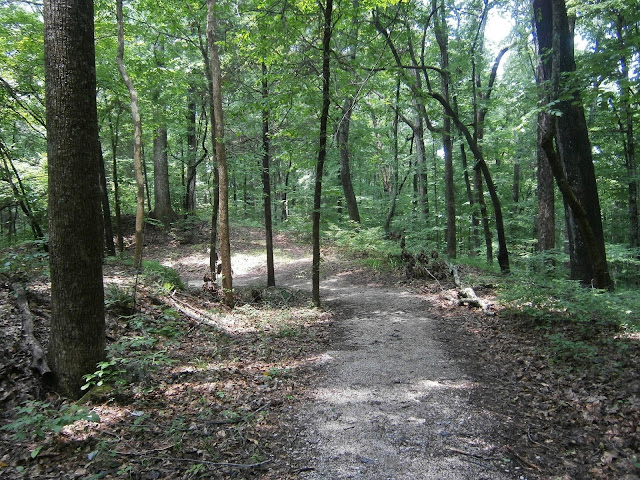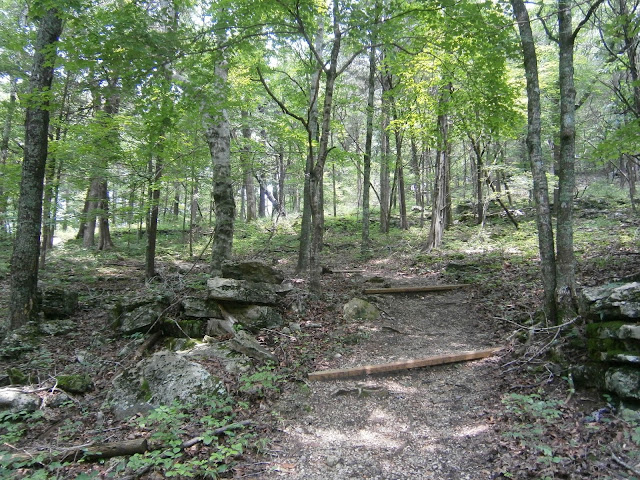Mammoth Cave Park was very crowded, today,
but not on the surface trails.
Most of the people were in the caves.
These surface trails are some of the best places to take a walk in KY.
There are many different trails you can take around the
Visitors' Center (see the map below).
Click here for Basic Information about Mammoth Cave Park.
Directions to get to the park.
Today, we decided to take these trails (see map below):
Beginning at the amphitheater we took the short trail to the campground, then turned right and
headed down toward Echo River; turned right and got on the Mammoth Dome Sink trail;
then turned left onto the Heritage Trail, ending up back at the hotel parking lot.
Map of the Trails near the Visitors' Center.
There are many more hiking trails on the other side of the
Green River. Grab a map at the Center and take the ferry across.
From the South Parking Lot walk toward the SE and
you'll see an asphalt trail leading to the boardwalk, below.
but not on the surface trails.
Most of the people were in the caves.
These surface trails are some of the best places to take a walk in KY.
There are many different trails you can take around the
Visitors' Center (see the map below).
Click here for Basic Information about Mammoth Cave Park.
Directions to get to the park.
Today, we decided to take these trails (see map below):
Beginning at the amphitheater we took the short trail to the campground, then turned right and
headed down toward Echo River; turned right and got on the Mammoth Dome Sink trail;
then turned left onto the Heritage Trail, ending up back at the hotel parking lot.
Map of the Trails near the Visitors' Center.
There are many more hiking trails on the other side of the
Green River. Grab a map at the Center and take the ferry across.
From the South Parking Lot walk toward the SE and
you'll see an asphalt trail leading to the boardwalk, below.
 |
| You'll soon come upon this boardwalk, which leads to the campground. The amphitheater is to the right. |
Turn right just before the campground and get onto this trail,
which leads down to the Echo River.
 |
| It rained alot, yesterday; you can see the standing water. Usually a good time for mushrooms. |
 |
| We immediately saw this mushroom... Destroying Angel, a deadly mushroom. |
Click here to learn about this species,
Amanita bisporigera.
Pure white mushroom --
Mycorrhizal with oaks;
Destroying Angel
 |
| A Chanterelle...beautiful color. |
Click here for info on Chanterelles.
Funnel-shaped mushroom;
Exquisite to cook and eat;
Chanterelles
 |
| The trail begins to descend toward the river. |
Heard and saw a Wood Thrush.
 |
| Photo taken from the Cornell Site |
Click here to hear one of the most beautiful birdsongs on Earth,
and learn more about the Wood Thrush.
A flute-like song
Ringing through the forest;
The Wood Thrush.
 |
| A Bolete near a group of Coral Fungi. |
Click here to learn about Boletes.
 |
| More Chanterelles |
 |
| Turn left here...leading you to a cedar forest. |
Heard and saw an Indigo Bunting.
 |
| Photo taken from the Cornell site. |
Click here for information on the Indigo Bunting.
 |
| I like the texture of the caps of these mushrooms. |
 |
| The right side of this trail was lined with Coral Fungi... the most I've ever seen in one spot. Click any photo to enlarge it. |
 |
| The white-tailed deer are very docile, here. |
Click here to learn about deer.
Heard an Ovenbird here.
 |
| Photo taken from Cornell Site. |
 |
| When the cap of Lactarius indigo is broken it exudes a blue liquid compound. |
Click here for info on the Blue Mushroom.
A blue mushroom
Hiding under the leaves;
Indigo Milk Cap.
 |
| Pale Spiked Lobelia (Lobelia spicata) |
Click here to learn about this plant.
 |
| Turn right here. This trail takes you all the way down to the Echo River Spring and the Green River Ferry, but we won't go down to the river, today. |
 |
| Tiny Marasmius mushrooms. |
Orange Pinwheel Mushroom;
A tiny orange pleated cap
On a brown stem.
 |
| A species of Lactarius or Russula. |
Remember, when you take a walk in the woods just walk slowly
and stop often to observe the area around you.
Stop, look, and listen, often!
 |
| A group of male Moss plants (green florettes) along with some females. |
 |
| A Pearl Crescent or Pearly Crescentspot butterfly... about 1.5 inches. |
Click here for info about this butterfly.
 |
| Some crazy looking black/dark gray mushrooms. |
Heard a Parula.
 |
| Photo taken from Cornell Site. |
 |
| Turn right here and walk toward White's Cave (see map). When you turn right you are on the Mammoth Dome Sink Trail . |
 |
| Click to enlarge the map. |
 |
| This fern, Cliffbrake, likes to grow near rocky outcrops. |
 |
| A short walk up-hill to White's Cave. |
 |
| You cannot go into this cave, there's a barrier at the entrance. |
 |
| Ruellia (Wild Petunia) with pollinator. |
 |
| Bottlebrush Grass |
 |
Heard a Prairie Warbler.
 |
| Photo taken from Cornell site. |
Click here for info about this warbler and listen to its song.
 |
| Tall Bellflower (Campanula americana) |
Click here to learn about the Tall Bellflower.
 |
| An unusual fungus called Earth Star. It's a kind of puffball with its outer layer peeled back. |
Click here to watch an Earth Star release its spores.
 |
| Fleabane and pollinator. |
 |
| Prickly Pear Cactus Most people don't know that a species of cactus grows here in Kentucky. Such a gorgeous Yellow-orange flower on the Prickly Pear Cactus. |
 |
| It has an extremely beautiful flower, this time of the year. |
 |
| Spangle Grass |
 |
| This is at a point between White's Cave and Mammoth Dome Sink. |
 |
| Almost missed this moth...looks exactly like the lichen near it. If it had been on the lichen, I never would have seen it. |
 |
| I don't know how Kai spotted this baby Praying Mantis. |
Click here to watch a great video about mantids.
 |
| Some beautiful Maidenhair Ferns. Information on this species. |
 |
| The bark has peeled away revealing the carvings of a species of insect borer. |
 |
| You can see another trail, down below. That is the trail that connects this trail to the Echo River Spring Trail (see map). The intersection is up ahead. |
 |
| White Avens (Geum canadense) |
Click here for info on White Avens.
 |
| Whenever you see mushrooms remember that the main body of the fungus is under the bark growing within the wood tissue. The mushrooms are just the reproductive tissues. |
 |
| Surrounded by Pawpaw trees. |
Click here to read about Pawpaws and see a video.
 |
| On the top left is a plant called Spikemoss (Selaginella) and in the middle are plants called Cleavers. |
Click here to learn more about Cleavers.
 |
| A species of nasty looking Jelly Fungus. |
 |
| I like the bark of the Shagbark Hickory on the right. Ahead you can see an information marker telling you about the Mammoth Dome Sink, which is to the right. |
The depression ahead is the top of Mammoth Dome Sink,
which is a gigantic, deep columnar sinkhole.
 |
| Continue around this horseshoe section of the trail. The parking lot is on top of the hill. |
 |
| Jelly Babies (Leotia lubrica). Click the photo to enlarge it. |
Click here to learn about Jelly Babies.
"Tiny brown mushrooms crown most of the dead leaves. That so many species and
individuals could suddenly appear from a forest floor that I have gazed at for months is a
reminder of how much of the forest's life is invisible to us, even with close observation.
But unseen doesn't mean unimportant: these are the engines of decay, keeping nutrients
and energy moving through the forest ecosystem."
D.G. Haskell
 |
| Ebony Spleenwort (fern) among some Coral Fungus. |
Click here to learn about Ebony Spleenworts.
 |
| A species of Stereum fungus. |
 |
| This trail leads to the Heritage Trail near the Visitors' Center. |
 |
| See the snail (on the stalk) snacking on this large mushroom? |
 |
| Turn left here to see Sunset Point. |
 |
| Another Destroying Angel. Don't play around with this mushroom! |
 |
| Looks like another kind of Lactarius mushroom. |
 |
| This is Sunset Point overlooking the Green River Valley. |
 |
| The Green River Valley below Sunset Point. It's much more spectacular in the Fall. |
 |
| If you know the name of this one, email me (go to my profile). |
 |
| An observation deck allows you to look down on the River Styx Spring Trail, which leads down to the Green River. What you're looking at is the entrance to the Historic Cave Tour. |
 |
| American Germander or Wood Sage |
 |
| Wood Sage with pollinator. |
or Wood Sage.
From this point you can see the Hotel and the parking lot.
What a walk! Can you believe the number of different kinds
of mushrooms and other fungi we saw? A mycologist's heaven.
If you come to Mammoth Cave Park don't forget
the many different surface trails that you can hike.
Get out and explore your surroundings.



